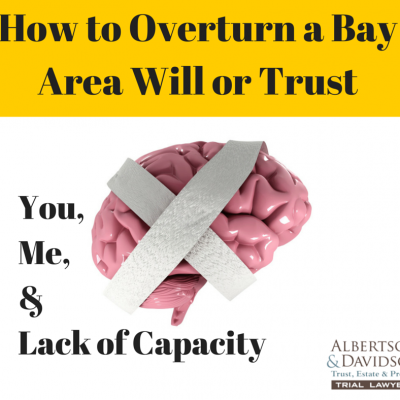
The single most pleaded claim to overturn a Bay Area Trust or Will is lack of capacity. And while you and I may believe the decedent clearly lacked capacity, proving that claim in court is another matter altogether.
It takes an expert
Proving lack of capacity starts with obtaining all of the decedent’s medical records. What we hope to find is a mental defect, something along the lines of dementia, Alzheimer’s disease or similar mental problem. We must find a mental defect in order to meet the requirements of Probate Code section 811, which requires evidence of a mental defect to challenge a person’s capacity.
But the medical records, in themselves, are useless in Court because they contain hearsay evidence. That is, the diagnosis of a doctor made after observation and analysis. Even the business-records exception to hearsay is not sufficient to admit a doctor’s diagnosis into evidence. So how do you admit evidence for lack of capacity? You need an expert witness, a medical doctor who can review the medical records and then give an opinion as to the mental defect in court.
Sounds simple enough, the problem is that expert witnesses are expensive. To hire a medical doctor, have them review the medical records, give you an opinion, sit for a deposition (the opposing part will want to depose the expert) and then take time to testify in court takes a lot of time. And time is money. You can expect to pay anywhere from $20,000 to $30,000 or more for a good expert witness by the time you get through trial. That’s some serious cash.
The bottom line: proving lack of capacity is not so easy after all. It takes good medical records, a good expert, and a fair amount in fees and costs.
